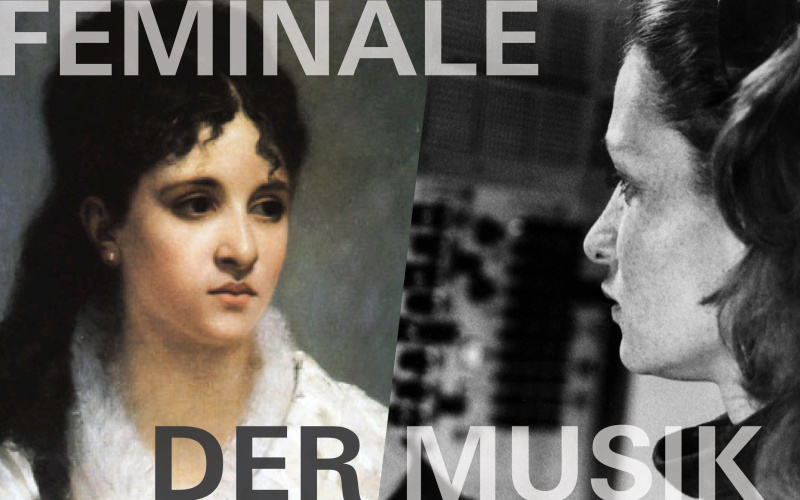Clara Schumann
Feminale of Music
»The practice of art is a big part of who I am. It's the air I breathe.« – Clara Schumann to Johannes Brahms, letter of October 15, 1868
Together with Fanny Hensel, Clara Schumann (1819–1896) is probably the most famous woman in music history today. In contrast to Fanny Hensel, who is largely forbidden to appear in public by her father and brother, Clara Schumann is systematically built up for a public career by her father as a child. She begins her career as a child prodigy at the piano with a performance at the Leipzig Gewandhaus at the age of 9. A picture-book career develops, during which Clara Schumann is one of the most sought-after international top pianists over many decades with exceptional consistency. She celebrates her 60th stage anniversary a few years before her death.
Even as a child, Clara Schumann also received composition lessons – an important building block of her career, since in the early 19th century the »composer-pianist« is a typical appearance, i.e. the composing pianist who plays his own compositions on the concert stage. Later, Clara is inspired to write her own compositions, especially by her husband, the composer Robert Schumann. For example, a joint composition is created, which is published under both names, the song cycle »Liebesfrühling« based on poems by Friedrich Rückert. Clara Schumann's oeuvre mainly comprises piano works and songs, but also chamber music and orchestral works. One of her most important compositions is the Piano Trio in G minor op. 17 from 1846. Clara Schumann died on May 20, 1896 in Frankfurt am Main.
In addition to the support of her husband, Clara Schumann is also handicapped in her own career by him. The largest English-language musicological encyclopedia, Grove, notes that Robert's creative work had priority over hers, and that for many years Clara was allowed to play and compose piano only during the hours when her husband was not disturbed. Other sources report that the concert tours that were important to Clara were always significantly restricted by Robert. After Robert's early death, Clara concentrated on her concert activities, gave up composing and moved to Baden Baden in 1862. In her small house in Lichtental on the edge of the Kloserwiese, musical salon culture is practiced. Besides Johannes Brahms, Clara Schumann is also friends with Pauline Viardot-Garcia, a celebrated singer of her time, who is introduced in the living room concert today by Malika Reyad.
Today's day of the »Feminale of Music« is dedicated to the city of Karlsruhe. A radio feature by Clara Müller-Wirth entitled »Clara Schumann in Karlsruhe«, which was created as part of her Bachelorthesis 2019/2020 at the Karlsruhe University of Applied Sciences and the Karlsruhe University of Music, will be released. In it Clara Müller-Wirth reports on Clara Schumann's performances in Karlsruhe and quotes contemporary newspaper reviews and diary notes by Clara Schumann. The musicologists Beatrix Borchard and Joachim Draheim contribute expert knowledge about Clara Schumann in general and about her relationship to Karlsruhe.
Music Pieces
Pieces that Clara Schumann frequently performed in Karlsruhe include her own composition »Liebeszauber« and »Traumeswirren« by Robert Schumann. She played Brahms' famous Piano Quintet for the first time in Karlsruhe, in the house of the Karlsruhe Court Kapellmeister Hermann Levi, with whom she was a close friend.
Liebeszauber aus Sechs Lieder, Op. 13 #3, published by and sung by Anne Wright (soprano) accompanied by Brent Funderburk (piano). Recorded live at the Ravinia Steans Institute in August 2016
Robert Schumann: Fantasiestück Op.12 No. 7, published by Max Lima: Martha Argerich (piano) plays live on 29/01/2019 Fantasiestück »Traumes Wirren« as part of a concert recorded by the Italian radio station Rai 5
Johannes Brahms Sonata in F minor op. 34 b, published by and performed by Anastasia (1st piano) & Liubov Gromoglasova (2nd piano), recorded in 2012 at their duo recital in the Small Hall of the Moscow Conservatory.
In the summer of 1864 – during Brahms' stay with Clara Schumann in Baden-Baden – both played the Sonata for two pianos for the later Countess Anna von Hessen
Disclaimer
-
Links to external websites of other providers
The ZKM’s express objective is the accuracy and current relevance of any information it makes available on this web site. Mistakes and ambiguities cannot, however, be fully excluded. For this reason, the ZKM is unable to fully guarantee the current relevance, accuracy, completeness or quality of the information it makes available. The ZKM is not subject to coercible legal rules and regulations and to any kind of damages of a material or immaterial nature that may possibly be caused by the use or non-use of the information provided, including free downloads. The ZKM reserves the right to change or delete, to temporarily or permanently suspend access to the web sites at any time.
The responsibility for »external content« to which access is made, in the form of e.g., links, presupposes, among other things, positive knowledge of illegal or punishable content. The ZKM has no influence on this external content and entirely distances itself from such content. Should the displayed external web site include unlawful or offensive content, the ZKM expressly distances itself from such content. When made knowledgeable of such content, the ZKM will deactivate the corresponding link. The same holds for external entries contained in Blogs and discussion forums, links directories, mailing lists and all other forums of databanks operated by the ZKM, the content of which is rendered possible via write access.
All content of the present web site (texts, images, video stills, videos, audios, graphics etc.), the structure as well as the layout of this web site is protected by copyright. These contents, and the information made available by the ZKM (e.g., text and image materials) are available exclusively for individual usage by users of this web site, and not for commercial purposes. These contents may be distributed and copied, made public on the Internet and used for commercial purposes only with the prior consent of the ZKM. Similarly, the placing of deep links, inline links, frame links or similar links in which the ZKM web site is not clearly evident as source, is permitted only with the prior consent of the ZKM. Messages and references to content »share« in social media (e.g. Facebook) do not come under the proviso of this reserve approval. For press releases and photographs valid instructions for usage can be found at: www.zkm.de/en/press/service.
All labels and trademarks named and protected by third parties are subject to the unreserved stipulations of the respective registered owners. That trademarks are not protected by third part rights cannot be assumed merely by mention of the name.
This disclaimer is to be understood as part of the ZKM’s Internet content. In so far as part or single formulations of this text do not, are no longer or are do not entirely correspond to this legal provision, the remaining parts of this document remain unaffected in its content and validity.

